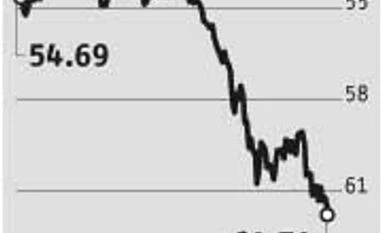The battle to save the rupee seems to be getting tougher with each passing day. As though firm oil prices and rising US treasury yields were not bad enough, a majority of economists in the US believe the bond buying programme might be tapered from September. Effectively, there is very little time to fix the currency and avert an external crisis. As long as US treasury yields keep rising, capital outflows from India will increase.
The Reserve Bank of India (RBI) tried to defend the rupee but its conflicting commentary has taken away the effectiveness of these measure. Strategists say that soon after it announced the tightening measures last month, RBI took the impact away by terming these measures "temporary". The Street believes the central bank's recently-announced capital controls will not help save more than $4 billion this year. Sanjeev Prasad of Kotak Institutional Equities believes it is time to pull out the big guns before it is too late. He says: "The rupee continues to drift down, (which) suggests that government and RBI may require more effective measures to fight the current account deficit/balance of payments and fiscal problems."
It is apparent from Friday's carnage that the market does not believe the capital curbs put on individuals and companies will yield more than $4-4.5 billion at best. Though outward foreign investments have increased over the past few years, RBI's curbs will not mean much in actual terms. Over the past four quarters, Indian companies have made overseas direct investment (ODI) of $7.1 billion. Morgan Stanley says: "While it is unclear what will be the likely decline in ODI due to these restrictions, assuming that it declines by 50 per cent, it will help reduce the balance of payment deficit by $3.5 billion annually." Like it has capped overseas transactions of companies to 100 per cent of their net worth, RBI has also curbed outward remittances by Indian to $75,000 a year from the earlier figure of $200,000 a year. Over the past two years, outward remittances by Indians have remained in the range of $1-1.2 billion, with outflows for gifts, investment in debt/equity, maintenance of relatives and studies abroad accounting for 70 per cent of total outflows, says Morgan Stanley. Assuming these also decline by 50 per cent, the measure would only yield $500 million.
So, what more can the government do to prevent an external crisis? Experts believe a domestic tax on gold would works better than import controls. Also, if the government mandates consumers to disclose income tax details for even smaller quantities of gold purchases, it might work better. On the inflows side, strategists and economists believe the government should do more to capital flows into equities rather than debt. Kotak's Prasad believes selling the government's minority stakes in well-liked companies would result in FII inflows and higher revenues for the government, enabling it to meet its divestment target. A higher one-time hike in diesel prices would also help improve the financials of oil PSUs and lower oil consumption. The market continues to believe that non-resident deposits at higher rates would help attract $15 billion.
The Reserve Bank of India (RBI) tried to defend the rupee but its conflicting commentary has taken away the effectiveness of these measure. Strategists say that soon after it announced the tightening measures last month, RBI took the impact away by terming these measures "temporary". The Street believes the central bank's recently-announced capital controls will not help save more than $4 billion this year. Sanjeev Prasad of Kotak Institutional Equities believes it is time to pull out the big guns before it is too late. He says: "The rupee continues to drift down, (which) suggests that government and RBI may require more effective measures to fight the current account deficit/balance of payments and fiscal problems."
It is apparent from Friday's carnage that the market does not believe the capital curbs put on individuals and companies will yield more than $4-4.5 billion at best. Though outward foreign investments have increased over the past few years, RBI's curbs will not mean much in actual terms. Over the past four quarters, Indian companies have made overseas direct investment (ODI) of $7.1 billion. Morgan Stanley says: "While it is unclear what will be the likely decline in ODI due to these restrictions, assuming that it declines by 50 per cent, it will help reduce the balance of payment deficit by $3.5 billion annually." Like it has capped overseas transactions of companies to 100 per cent of their net worth, RBI has also curbed outward remittances by Indian to $75,000 a year from the earlier figure of $200,000 a year. Over the past two years, outward remittances by Indians have remained in the range of $1-1.2 billion, with outflows for gifts, investment in debt/equity, maintenance of relatives and studies abroad accounting for 70 per cent of total outflows, says Morgan Stanley. Assuming these also decline by 50 per cent, the measure would only yield $500 million.
So, what more can the government do to prevent an external crisis? Experts believe a domestic tax on gold would works better than import controls. Also, if the government mandates consumers to disclose income tax details for even smaller quantities of gold purchases, it might work better. On the inflows side, strategists and economists believe the government should do more to capital flows into equities rather than debt. Kotak's Prasad believes selling the government's minority stakes in well-liked companies would result in FII inflows and higher revenues for the government, enabling it to meet its divestment target. A higher one-time hike in diesel prices would also help improve the financials of oil PSUs and lower oil consumption. The market continues to believe that non-resident deposits at higher rates would help attract $15 billion.
)